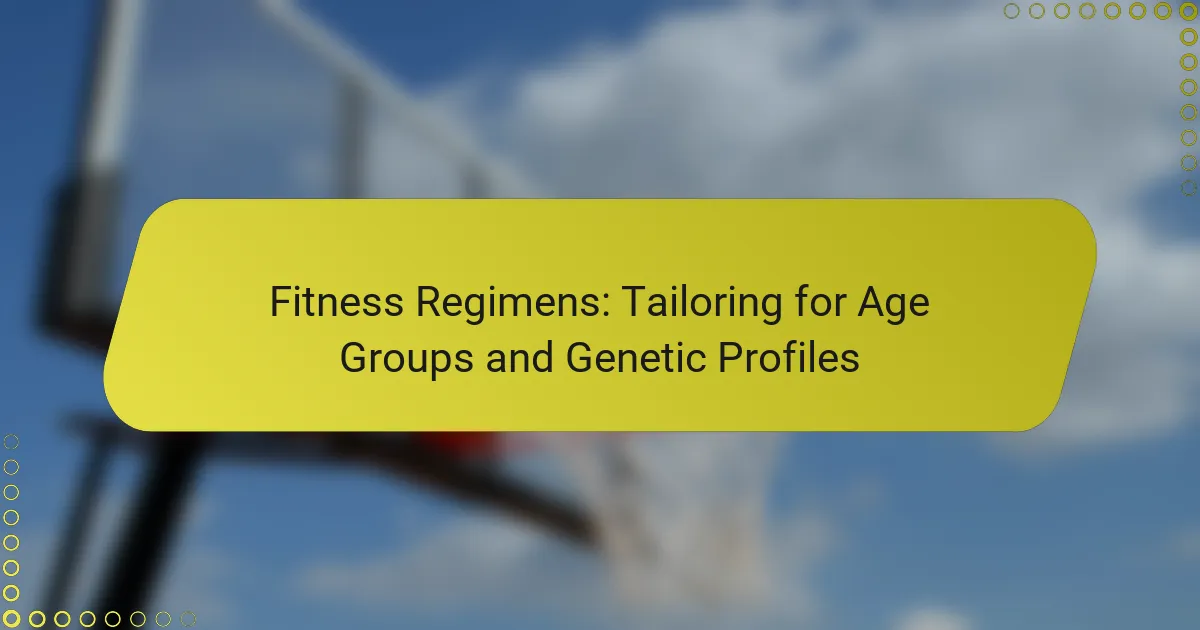Genetic testing offers young adults valuable insights into their unique genetic makeup, which plays a crucial role in their fitness and athletic performance. By analyzing specific genes, individuals can tailor their exercise and nutrition regimens to optimize performance, enhance recovery, and minimize injury risks. This personalized approach empowers young adults to make informed decisions about their fitness journeys.

How Can Genetic Testing Improve Fitness for Young Adults?
Genetic testing can enhance fitness for young adults by providing insights into their unique genetic makeup, which influences how they respond to exercise and nutrition. By understanding these genetic factors, individuals can tailor their fitness regimens to maximize performance and minimize risks.
Personalized workout plans
Genetic testing can help create personalized workout plans that align with an individual’s genetic predispositions. For instance, some people may have genes that favor endurance activities, while others may excel in strength training. Knowing this can guide young adults in selecting the right types of exercises to optimize their training outcomes.
When developing a workout plan, consider factors such as muscle fiber composition and recovery rates. For example, if genetic testing indicates a higher proportion of fast-twitch muscle fibers, incorporating high-intensity interval training (HIIT) may be beneficial. Regularly reassessing fitness goals based on performance can also help in adjusting the plan as needed.
Nutrition optimization
Genetic insights can significantly enhance nutrition optimization for fitness. Certain genes affect how individuals metabolize macronutrients, which can influence dietary choices. For example, some may benefit from a higher carbohydrate intake, while others may thrive on a protein-rich diet.
To optimize nutrition, young adults should consider their genetic predispositions when planning meals. Utilizing a balanced diet that aligns with genetic recommendations can improve energy levels and recovery. Regularly tracking food intake and performance can help identify what works best for individual needs.
Injury risk assessment
Genetic testing can provide valuable information regarding injury risk, allowing young adults to take preventive measures. Certain genetic markers are associated with a higher likelihood of injuries, such as tendon or ligament issues. Understanding these risks can help in modifying training intensity and recovery strategies.
To mitigate injury risks, young adults should incorporate flexibility and strength training into their routines, especially if their genetic profile indicates vulnerability. Regular assessments and listening to the body can help in adjusting activities to avoid overtraining and injuries. Additionally, consulting with fitness professionals can provide tailored advice based on genetic insights.

What Are the Best Genetic Testing Services for Fitness?
The best genetic testing services for fitness provide insights into how your genetic makeup influences your physical performance, recovery, and overall health. These services typically analyze DNA to offer personalized recommendations for exercise, nutrition, and wellness strategies.
23andMe
23andMe is a well-known genetic testing service that offers health and ancestry insights, including fitness-related traits. Their fitness reports cover aspects like muscle composition, endurance, and recovery, helping users understand how their genetics may affect their athletic performance.
When using 23andMe, consider their comprehensive approach, which includes both genetic predispositions and lifestyle factors. The service is user-friendly, with results accessible through an online platform, making it easy to track your fitness-related genetic information.
DNAfit
DNAfit specializes in fitness and nutrition genetic testing, providing tailored reports that focus on exercise preferences, recovery, and dietary needs. Their analysis helps users identify the best types of workouts for their genetic profile, whether it’s strength training or endurance activities.
With DNAfit, you receive actionable insights that can guide your fitness regimen. They offer personalized meal plans and workout recommendations based on your genetic data, which can enhance your training effectiveness and overall health.
MyHeritage
MyHeritage primarily focuses on ancestry but also offers health reports that include fitness-related genetic insights. Their service can reveal how your genes may influence physical traits and health conditions that could impact your fitness journey.
While MyHeritage may not be as fitness-focused as 23andMe or DNAfit, it provides valuable genetic information that can complement your fitness goals. Users should consider integrating their findings with other fitness-specific insights for a more comprehensive understanding of their health and performance potential.

What Insights Can Genetic Testing Provide for Performance?
Genetic testing can offer valuable insights into how an individual’s genetic makeup influences their athletic performance. By analyzing specific genes, young adults can understand their potential in areas such as muscle composition, metabolism rates, and recovery times, allowing for tailored training and nutrition strategies.
Muscle composition
Genetic testing can reveal whether an individual is predisposed to have a higher proportion of fast-twitch or slow-twitch muscle fibers. Fast-twitch fibers are advantageous for explosive strength and speed, while slow-twitch fibers are better for endurance activities. Understanding this can help young athletes choose sports or training regimens that align with their natural strengths.
For example, someone with a genetic inclination toward fast-twitch fibers may excel in sprinting or weightlifting, while another with more slow-twitch fibers might perform better in long-distance running or cycling. This knowledge can guide training focus and competitive choices.
Metabolism rates
Genetic testing can indicate how efficiently an individual metabolizes different nutrients, which directly impacts energy levels and performance. Certain genes are linked to the speed of carbohydrate and fat metabolism, influencing how quickly an athlete can fuel their body during workouts or competitions.
For instance, someone with a genetic predisposition for rapid carbohydrate metabolism may benefit from a high-carb diet to sustain energy during intense training. Conversely, those with slower metabolism rates may need to monitor their carbohydrate intake more closely to avoid fatigue.
Recovery times
Genetic factors can also affect recovery times after physical exertion. Some individuals may have genetic markers that indicate a quicker recovery, allowing them to train more frequently or at higher intensities. Understanding one’s recovery profile can help in planning training schedules and rest periods effectively.
For example, athletes with a genetic advantage in recovery may find they can resume training within a day or two after intense sessions, while others might require longer recovery periods. Tailoring training plans based on these insights can optimize performance and reduce the risk of injury.

How to Choose a Genetic Testing Service?
Choosing a genetic testing service involves evaluating factors such as cost, data privacy, and the types of reports offered. Prioritize services that align with your fitness goals and provide clear, actionable insights based on your genetic profile.
Cost considerations
The cost of genetic testing services can vary significantly, typically ranging from a few hundred to over a thousand USD. Consider what is included in the price, such as consultations or additional reports, to ensure you get value for your investment.
Some services may offer payment plans or discounts for bundled tests, so explore these options. Always check for hidden fees, such as shipping or processing costs, which can affect the overall expense.
Data privacy policies
Data privacy is crucial when selecting a genetic testing service. Review the company’s privacy policy to understand how your genetic information will be stored, used, and shared. Look for services that comply with relevant regulations, such as GDPR in Europe or HIPAA in the United States.
Ensure the service provides options for data deletion and control over who can access your information. Transparency about data handling practices can help you make a more informed choice.
Available reports
Different genetic testing services offer various types of reports, focusing on aspects like fitness, nutrition, and overall health. Assess whether the reports provide actionable insights that align with your fitness goals, such as recommendations for exercise types or dietary adjustments.
Some services may offer personalized coaching or follow-up consultations based on your results, which can enhance the value of the reports. Compare the depth and clarity of the information provided to choose a service that meets your needs effectively.

What Are the Limitations of Genetic Testing for Fitness?
Genetic testing for fitness has several limitations that can affect its reliability and applicability. While it can provide insights into potential strengths and weaknesses, it does not account for the full complexity of human fitness, including environmental and lifestyle factors.
Ethical concerns
Ethical issues surrounding genetic testing for fitness include privacy, consent, and potential discrimination. Individuals may worry about how their genetic information could be used by employers or insurance companies, leading to unfair treatment based on perceived fitness levels.
Moreover, there is a risk that genetic testing could promote a narrow definition of fitness, potentially stigmatizing those who do not meet certain genetic benchmarks. This raises questions about inclusivity and the societal implications of labeling individuals based on their genetic predispositions.
Accuracy of predictions
The accuracy of genetic testing predictions can vary significantly. Many tests provide probabilities rather than certainties, meaning that a favorable genetic profile does not guarantee superior athletic performance. For instance, a person may have genes associated with endurance but still lack the training or motivation to excel.
Furthermore, the science of genetics is still evolving, and many genetic markers linked to fitness are not fully understood. This uncertainty can lead to overconfidence in the results, which may mislead individuals about their true potential.
Environmental factors
Environmental factors play a crucial role in fitness and can overshadow genetic predispositions. Elements such as diet, training regimen, sleep quality, and overall lifestyle choices significantly influence athletic performance. For example, two individuals with similar genetic profiles may have vastly different outcomes based on their training environments.
Additionally, factors like access to facilities, coaching, and social support can greatly impact fitness levels. Therefore, while genetic testing can offer insights, it should be viewed as one piece of a larger puzzle that includes environmental influences and personal effort.

How to Interpret Genetic Testing Results for Fitness?
Interpreting genetic testing results for fitness involves understanding how specific genes can influence physical performance, recovery, and overall health. Key insights can guide training regimens, dietary choices, and injury prevention strategies.
Understanding Genetic Markers
Genetic markers are specific sequences in DNA that can indicate predispositions to various traits, including athletic performance. For fitness, markers related to muscle composition, endurance, and recovery rates are particularly relevant. Knowing which markers you possess can help tailor your fitness approach.
Common markers include those associated with the ACTN3 gene, which is linked to power and sprinting abilities, and the ACE gene, which may influence endurance. Understanding these markers allows individuals to align their training with their genetic strengths.
Evaluating Fitness Potential
Your genetic testing results can provide insights into your fitness potential by highlighting strengths and weaknesses. For instance, individuals with certain genetic profiles may excel in endurance sports, while others may be better suited for strength training. This knowledge can help set realistic fitness goals.
Consider using your genetic insights to focus on specific training modalities. If your results indicate a predisposition for endurance, incorporating more long-distance running or cycling into your routine may be beneficial. Conversely, if strength is your genetic advantage, prioritize weight training.
Integrating Results into Training Plans
To effectively integrate genetic testing results into your training plan, start by identifying your key genetic traits. Use this information to customize your workouts, nutrition, and recovery strategies. For example, if your results suggest a slower recovery rate, you might benefit from longer rest periods between intense workouts.
Additionally, consider consulting with a fitness professional who understands genetic testing. They can help interpret your results and create a personalized training program that maximizes your genetic advantages while addressing any potential limitations.
Common Misinterpretations
Many individuals misinterpret genetic testing results by assuming they dictate absolute outcomes. Genetics can influence potential, but they do not determine success. Environmental factors, training intensity, and personal motivation also play significant roles in fitness achievements.
Avoid the pitfall of neglecting other important aspects of fitness, such as nutrition and mental resilience. Genetic insights should complement a holistic approach to health and fitness, rather than serve as the sole basis for training decisions.



